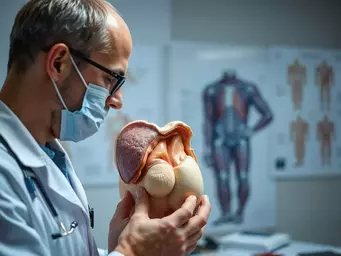Testosterone's Vital Roles
- ✓ Muscle Mass & Strength
- ✓ Bone Density Support
- ✓ Mood Regulation
- ✓ Sexual Function
Every journey towards better health starts with understanding the vital role of hormones. As we delve into the significance of testosterone, consider this: low levels can affect your mood, energy, and overall well-being. Are you ready to take control of your health?
Testosterone is vital for men's overall well-being. Understanding its impact and how lifestyle choices affect it is crucial for maintaining vitality.
Testosterone is often thought of as the quintessential male hormone, but its role extends far beyond just masculinity. It’s essential for a variety of bodily functions that contribute to overall well-being. From muscle strength and bone density to mood regulation and cognitive function, testosterone plays a pivotal role in maintaining a healthy lifestyle, as highlighted in a publication from the Harvard Medical School.
Recognizing the importance of testosterone can empower men to take proactive steps toward their health. Understanding how this hormone impacts various aspects of life helps in making informed choices that promote vitality and longevity.
Testosterone serves multiple functions that are crucial for men's health. It is involved in:
These key roles underline the necessity of maintaining optimal testosterone levels throughout life. When we understand its importance, we can better appreciate the need for regular check-ups and lifestyle adjustments.
Low testosterone levels, or hypogonadism, can lead to a host of challenges that affect daily life. Many men experience symptoms such as:
Living with these symptoms can be frustrating and can significantly impact quality of life. It’s essential to recognize these signs and seek help, as treatment can restore balance and vitality.
As men age, testosterone levels naturally decline, typically starting around age 30. This gradual decrease can lead to various health issues, including:
By understanding how aging affects hormone levels, we can take proactive measures to mitigate these effects. Regular check-ups, lifestyle changes, and staying informed about hormone health are vital steps for maintaining well-being as we age, as detailed in research on testosterone and aging. Remember, knowledge is power, and taking control of your health can lead to a more fulfilling life!
To naturally boost your testosterone levels, consider incorporating strength training and high-intensity interval training (HIIT) into your routine. These exercises not only help build muscle but also stimulate hormone production, leading to improved energy levels and overall vitality.
When it comes to managing hormone health, particularly testosterone levels, integrating lifestyle changes with professional guidance can make a significant difference. It's not just about making changes; it's about knowing when to seek help to ensure you're on the right track. Have you ever felt uncertain about whether your symptoms require medical attention? Understanding when to turn to a healthcare provider is crucial for your overall well-being.
Here are a few signs that indicate it might be time to consider professional help for hormonal imbalance:
Consulting with a specialist, like myself, can help you identify the root causes of these symptoms and develop a tailored approach. Your health journey deserves the best support possible!
Professional assistance is particularly important if you suspect low testosterone levels are impacting your life. I often recommend getting a comprehensive hormone panel done to evaluate your testosterone levels along with other related hormones. This step can provide a clearer picture of your hormonal health and help us make informed decisions together.
It’s essential to remember that hormonal imbalances can stem from various factors, including lifestyle choices and underlying health conditions. By working with a qualified healthcare professional, you can create a comprehensive plan tailored to your needs.
Many individuals find that combining lifestyle modifications with hormonal treatments yields the best results. It’s a holistic approach that addresses both the symptoms and the underlying causes. For example, while I may recommend testosterone replacement therapy (TRT) for some patients, lifestyle changes like diet and exercise can enhance the effectiveness of that treatment, as suggested by research from University of Utah Health.
These combined efforts can lead to better health outcomes and improved overall quality of life. By addressing your testosterone levels from both medical and lifestyle perspectives, you truly empower yourself!
Testosterone replacement therapy can be a valuable tool for those experiencing significant testosterone deficiency. It may help alleviate symptoms like fatigue, mood changes, and low libido, providing a renewed sense of vitality. However, it's also essential to be aware of the potential risks associated with TRT.
Before starting any treatment, I encourage you to discuss all the benefits and risks with a qualified healthcare provider. Together, we can navigate these options to choose the best path tailored to your health needs.
Now that we've covered the importance of integrating lifestyle changes with medical guidance, let’s talk about actionable steps you can take to improve your testosterone levels naturally. Remember, every journey begins with a single step—what will yours be?
To truly make a difference in your testosterone levels, a personalized plan is essential. Start by evaluating your current lifestyle, including your diet, exercise, and stress levels. Take time to reflect on areas that may need improvement and set realistic goals!
Here’s how to create a plan that works for you:
By establishing a plan that aligns with your personal goals, you’re more likely to stay committed and achieve lasting results!
Sometimes, diet alone may not provide all the nutrients necessary for optimal hormone production. Incorporating nutritional supplements can help fill those gaps. Common supplements that may benefit testosterone levels include:
Before starting any new supplement, I recommend consulting with a healthcare provider to assess your individual needs. This way, you can ensure that you’re choosing the right supplements to support your health journey!
Embarking on the journey to improve your testosterone levels and overall health can be empowering! It’s about taking control of your well-being and making informed choices. I encourage you to start small—incorporate one or two changes at a time, and gradually build on your progress.
Remember, every step counts! If you ever feel overwhelmed or uncertain, don’t hesitate to reach out for help. At Hypogonadal Health, we’re here to support you in understanding your hormone health and achieving the vitality you deserve!
Here is a quick recap of the important points discussed in the article:



 What if the key to unlocking your vitality lies in understanding the hormones that influence your bo
What if the key to unlocking your vitality lies in understanding the hormones that influence your bo
 Recognizing that your environment can significantly influence your hormonal health is crucial. Have
Recognizing that your environment can significantly influence your hormonal health is crucial. Have
 Have you considered how fluctuations in your testosterone levels might affect your daily energy and
Have you considered how fluctuations in your testosterone levels might affect your daily energy and
 Trauma to the testicles can have profound effects on hormonal health, but understanding the causes a
Trauma to the testicles can have profound effects on hormonal health, but understanding the causes a